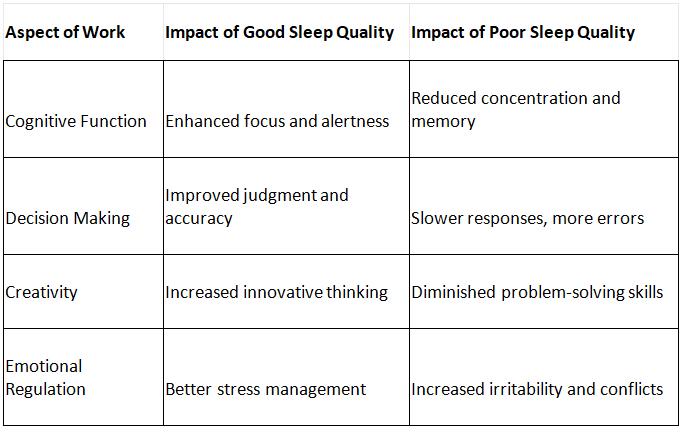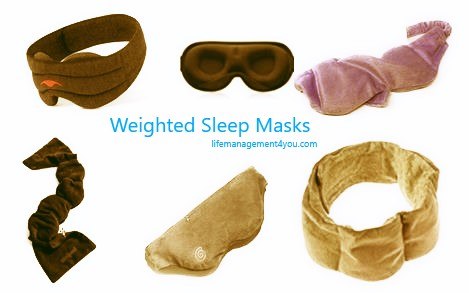
Sleep quality significantly impacts work performance, influencing cognitive function, decision-making abilities, and overall productivity.
In Australia alone, 60% of adults experience poor quality sleep, which can lead to reduced workplace efficiency and increased risk of accidents.
This comprehensive guide explores the crucial relationship between sleep quality and work performance, offering insights and strategies to enhance both.
How sleep quality affects performance?

Sleep quality significantly impacts work performance by enhancing cognitive functions, improving decision-making skills, boosting creativity, and regulating emotions.
Good sleep increases productivity, and problem-solving abilities, and reduces workplace errors and accidents.
Key Takeaways
- Quality sleep enhances cognitive functions, decision-making skills, and mental clarity.
- Sleep deprivation impairs focus, creativity, and problem-solving abilities.
- Consistent sleep schedules and sleep-friendly environments are crucial for better sleep quality.
- Employers play a vital role in promoting healthy sleep habits among employees.
- Investing in better sleep habits benefits both personal well-being and workplace dynamics.
- Short power naps can boost productivity during the workday.
- Technology can be both a hindrance and a help in improving sleep quality.
- The economic impact of poor sleep quality is significant, costing billions annually.
The Science Behind Sleep Quality and Work Performance
Sleep cycles, consisting of REM (rapid eye movement) and NREM (non-rapid eye movement) stages, are crucial for memory consolidation, information processing, and cognitive restoration.
Each cycle lasts about 90 minutes, with several cycles occurring throughout the night. Disruptions to these cycles can significantly impair cognitive abilities, affecting work performance.
Recent research from Australia sheds light on the undeniable link between sleep quality and enhanced workplace performance.
Poor sleep quality can lead to:

- Reduced cognitive function
- Impaired decision-making
- Increased risk of workplace accidents
- Decreased ability to retain information and skills
How Does Poor Sleep Quality Impair Cognitive Function at Work?
Sleep quality directly influences various aspects of cognitive function that are crucial for work performance.
- Memory and Learning: Sleep helps transfer short-term memories into long-term storage, enhancing information retention and skill acquisition.
- Decision-Making and Problem-Solving: Well-rested individuals demonstrate faster and more accurate critical thinking skills.
- Creativity: Proper rest fuels creative thinking and innovative problem-solving.
- Emotional Regulation: Good sleep quality improves stress management and maintains a calm demeanor, positively affecting team dynamics and workplace morale.
Strategies to Improve Sleep Quality for Better Work Performance
For Employees
- Establish a Consistent Sleep Schedule: Aim to go to bed and wake up at the same time every day, even on weekends.
- Create a Sleep-Friendly Environment: Ensure your bedroom is cool (15-21°C), dark, and quiet.
- Limit Screen Time Before Bed: Avoid screens at least an hour before bedtime to prevent disruption of melatonin production.
- Incorporate Relaxation Techniques: Practice mindfulness exercises, deep breathing, or gentle yoga to unwind before sleep.
- Regular Physical Activity: Aim for 30 minutes of moderate-intensity physical activity daily to improve sleep quality.
What Strategies Can Employees Use to Improve Sleep Quality?
For Employers
- Promote Recovery: Educate employees about the importance of sleep and provide resources on healthy sleep habits.
- Optimize the Workspace: Consider implementing “rest zones” for short power naps and ensure the office environment is conducive to alertness.
- Offer Flexible Work Schedules: When possible, allow employees to align their work hours with their natural circadian rhythms.
- Provide Sleep Health Programs: Implement workplace interventions such as sleep hygiene education or fatigue management training.
Discover 15 effective strategies for improving your sleep quality.
How Can Employers Support Better Sleep Habits?
Real-World Examples
- Jeff Bezos, former CEO of Amazon, credits his success to consistently getting eight hours of high-quality sleep each night, believing it sharpens his decision-making skills.
- Google has embraced workplace rest by installing nap pods in their offices, recognizing that short naps boost creativity and productivity.
- A study by the University of Michigan found that workplace interventions targeting better sleep led to improved employee performance and reduced absenteeism.
Personal Experience: Transforming Sleep Habits for Better Work Performance
As a former staff manager, I experienced firsthand the detrimental effects of poor sleep quality on work performance.
My schedule required waking up at 4 AM and returning home around 8 PM, leading to chronic sleep issues.
This grueling routine not only affected my work efficiency but also posed safety risks, as I often found myself dozing off while driving home.
After 12 years in this role, I decided to overhaul my sleep habits
By implementing a consistent sleep schedule and creating a better bedtime routine, I noticed significant improvements in both my work performance and overall mood.
I also tried using sleep masks, which helped improve my sleep quality immensely.
Learn how sleep masks can significantly enhance your sleep quality.
The results were transformative.
Not only did my energy levels and work efficiency improve, but my personal life also benefited greatly.
I started enjoying more quality time with family and friends, demonstrating how better sleep quality can positively impact all aspects of life.
The Role of Technology in Improving Sleep Quality
While excessive screen time can negatively affect sleep, technology can also be leveraged to improve sleep quality:
- Sleep Tracking Apps: These can provide insights into your sleep patterns and help you identify areas for improvement.
- White Noise Machines: These devices can create a consistent, soothing background noise to promote better sleep.
- Smart Lighting: Programmable lights can mimic natural light patterns, helping to regulate your circadian rhythm.
- Meditation Apps: Guided meditation sessions can help you relax and prepare for sleep.
Remember to use these tools mindfully and avoid excessive screen time close to bedtime.
The Economic Impact of Poor Sleep Quality
The effects of poor sleep quality extend beyond individual performance to impact the broader economy:
- In Australia, sleep disorders cost the economy over $5 billion annually in health care and indirect costs.
- Productivity losses due to poor sleep quality are estimated at $17.9 billion per year.
- Workplace accidents related to fatigue cost approximately $2 billion annually.
These statistics from the National Center for Biotechnology Information underscore the importance of addressing sleep quality not just at an individual level, but as a societal and economic issue
Summary Table: Sleep Quality and Work Performance

Conclusion: Investing in Sleep Quality for Enhanced Work Performance
Understanding how sleep quality affects work performance is crucial for both personal and professional success.
By prioritizing good sleep habits and creating supportive work environments, employees and employers alike can reap the benefits of improved productivity, creativity, and job satisfaction.
Remember, quality sleep is not a luxury, it’s a necessity for optimal work performance.
Whether you’re looking to advance in your career, boost your productivity, or simply enjoy a more balanced life, investing in better sleep quality is a powerful step towards achieving your goals. [sleep health statistics]
FAQs
- How much sleep do I need for optimal work performance?
Most adults need 7-9 hours of quality sleep per night for peak cognitive function and work performance.
- Can short naps improve work performance?
Yes, short power naps (15-20 minutes) can boost alertness and productivity, especially during the mid-afternoon slump.
- How can employers support better sleep habits for their employees?
Employers can offer flexible work schedules, educate about sleep hygiene, create a work culture that values rest, and provide resources for sleep improvement.
By implementing these strategies and understanding the crucial link between sleep quality and work performance, individuals and organizations can unlock new levels of productivity and success.








